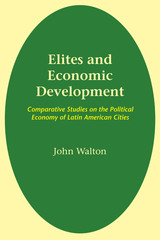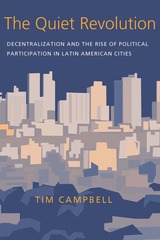
This book is a detailed comparative analysis of development politics in four urban regions of Latin America, two in Mexico and two in Colombia. John Walton has based his studies on the assumption that the problems of economic growth are essentially political, that is, are problems of choice, decision-making, and the exercise of power. His fundamental purpose has been to discover how elites of different kinds are more and less successful in the promotion of economic development, which he defines as a process in the organization of a society leading not only to higher levels of efficient output but also to a more equitable distribution of benefits.
At the time, the four cities compared were the second- and third-largest metropolitan areas in each country, Guadalajara and Monterrey in Mexico, Medellín and Cali in Colombia. This selection allows the author to pair, across countries, cases of early and large-scale industrialization (Monterrey and Medellín) with cases of more recent industrial growth in agricultural-commercial centers (Guadalajara and Cali). Walton presents historical introductions to each of the regions and integrates these with original fieldwork and interviews with more than three hundred members of the political and economic elites.
The findings are extensive, but in general they demonstrate that where political and economic power is more broadly distributed, where elites are more open and accessible, and where organizational life is more active and coordinated, regions tend to develop qualitatively as well as quantitatively, showing increases both in productivity and in such benefits as public services, housing, education, and a more balanced distribution of income. If these characteristics are absent, regions may be industrialized but do not provide a broad sharing of the benefits. Walton places a good deal of emphasis on the role of foreign investments, demonstrating that the more penetrated regions are also the less developed.
Finally, the results of these studies are used to evaluate and advance theories of underdevelopment and particularly of economic dependency.

As if by unseen signal toward the end of the 1980s, many Latin American governments suddenly transferred money and decision-making power to local municipalities. At the same time, national authorities allowed local governments to choose their leaders in free and open elections. The resulting revolution has been profound in its reach and stunning in the silent shift of power from central to local authorities.
The Quiet Revolution traces the growth and effects of decentralization and democratization in Latin America throughout the 1980s and 1990s. Based on first-hand accounts from mayors, local officials, and neighborhood leaders, Tim Campbell focuses on those cities and towns that made the most of their new intergovernmental arrangements. He further argues that the reforms, which are vital to long-term sustainable growth in the region, are in danger of being smothered by current policy responses from national and international institutions. Campbell's research, conducted over a ten-year span, counters conventional wisdom about the role of development banks in the process of state reform and offers timely insights into similar events taking place in other parts of the world.
READERS
Browse our collection.
PUBLISHERS
See BiblioVault's publisher services.
STUDENT SERVICES
Files for college accessibility offices.
UChicago Accessibility Resources
home | accessibility | search | about | contact us
BiblioVault ® 2001 - 2024
The University of Chicago Press









